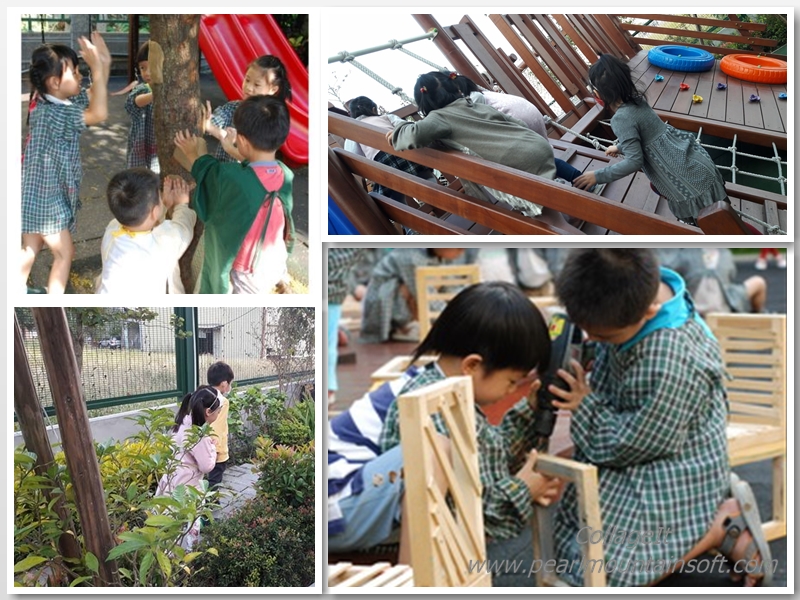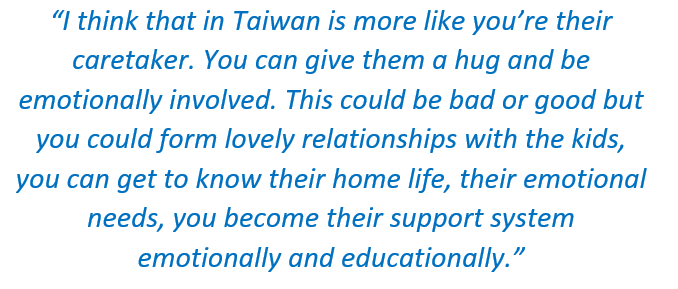My teaching abroad experiences started in Taiwan. After completing my TEFL training, I decided I wanted to work in Asia and so moved to Taichung, Taiwan. I began working for Season Arts Elementary School. I chose this learning community because they had a great reputation and were more alternative in teaching style than the typical, public Taiwanese education system.
From the first grade, roughly 6 years old, Season Arts begins teaching students using the Reggio Emilia approach. Reggio Emilia is a pedagogy that focuses on a student-centered approach where students learn through a self-directed and experiential learning environment. With this method the children must have control of their learning and be able to demonstrate through experiences of the sensory; touching, moving, listening, and observing.

The school also uses a thematic approach to teaching. This means they spend 3-months on a broad topic and the students learn through the theme, touching on different aspects of the topic. I noticed as soon as I began teaching, that the children were more free to learn through different means, and they were quite independent at a very young age. The teacher’s main role is to guide the children to do their own discoveries and learning. Kids were allowed to use tools and objects that I had not seen before. This caught my attention and I believe this approach was quite helpful for the young learners. For this reason I recently decided to interview Kristen, a Canadian teacher who has taught in Season Arts school for the past few years. Here she shares some of her experience as a Western educator teaching in the Eastern world:
Where are you from and where do you live?
I am from Sudbury, Ontario, Canada, and I have lived in Taichung, Taiwan for almost 6 years.
How long have you taught at Season Arts?
In my fourth year. I teach grades 1-3, and 6
What curriculum does Season Arts use?
We focus on the Reggio Emilia approach, and ESL is an offshoot of that philosophy called Makers.
What do you love about your students?
That they are curious. Even though this is a school where the students come from a more privileged background, the students are humble. The school atmosphere and environment makes them more interested on how things work.
For example, one time we were working on an animal theme, with focus on fish. We learned this topic through drawing, making crafts, and even having a mini aquarium inside the class. One day, a kid brought a fish scale from home from their last dinner, and he was so excited and so curious to include it to the theme.
What makes your class / school unique?
The fact that we do a curriculum that is not well accepted in Taiwan, because much of Asian education is very competitive, they all wish to catch up to Western standards, so they can compete in international ways. They want the accreditation in Asia to be the same as Western world. Very focused on testing and competitiveness. Taiwan is also a young country, which is why they are trying to compete with the rest of the world. A lot of critical thinking, and arts and humanity goes to the least side. And it’s more being a doctor, to make your family proud, to give back.
With Season Arts there’s different kinds of education, not just test scores. They redefine education based not 100% on test scores. Kids are kids with beautiful little minds. They should learn how to foster that and not repress it. At the school they focus on emotional intelligence, learning with peers, collaborating, discovering what they like to learn about rather than being told what to learn. That is what makes it special.

Why did you join the teaching profession?
I went to school to be a teacher, but then the administrative side of it discouraged me in Ontario. Sometimes teachers go beyond their realm as a teacher. I dropped out of concurrent education and learned history and religion and philosophy classes. And a friend going to Taiwan to teach pushed me to go as well.
What do you find different from education system in Canada from Taiwan?
I think that in Taiwan is more like you’re their caretaker. You can give them a hug and be emotionally involved. This could be bad or good but you could form lovely relationships with the kids, you can get to know their home life, their emotional needs, you become their support system emotionally and educationally. Close bonds with teachers is the difference. In younger grades in Canada, that’s not the case. There’s a line drawn about what a teacher should be even if they do lots more. They are asked to follow very strict rules, and it kind of places boundaries between teachers and students. This could also be a good thing, but it’s how I see this. I think there’s lack of emotional relationship with the teacher in Canada.
Share your story about a memorable classroom experience
Whenever there’s holidays, we have summer camp and winter camps at the school. One year was it was a camping/outdoor topic. I can do all these things from growing up in a farm in Canada. For example starting a fire with a flit. Imagine doing this with 6 year olds in a parking lot. You have to use wood and flint to start a fire. I remember teaching them to shave of the rod of a flint and hold it in a angel and strike it with a pocket knife. Which may sound so dangerous, for what they allow these kids to do. You give them a little safety tutorial before and give them all the materials.
We were in parking lot of the school which was empty at the time, gathered woods from around, and taught them about the different types of firewood. And just as they were all trying to get the fires going, the owner of the school comes in to park his car. At this point they all had little fires started. He was shocked, but I had to explain to him its suppose to be part of the lesson. But he looked so scared and parked his car far away just in case. It was one of my most memorable experiences, 6-7 years old making fires in the parking lot.
Share a personal cultural experience
I have learned a few times from living here in Taiwan that losing face is a big deal. How you are perceived by to others, or if you are critiqued by someone in front of others, is a big deal in this culture. One example of this was, I was asked to do a workshop in a staff meeting. We had to watch a demo of a teacher in another branch and talk about what we learned from the demo. The video was an American man who was reading a story very slowly and not asking them any questions at all. Even mispronouncing some words, so I thought this video must be to show what he did wrong. I then was leading the discussion, and asking the teachers how can we improve this, what could you have done differently. Foreigner teachers mentioned they would have brought in props, ask questions, use actions, etc. For the local teachers they had a harder time. They said the good parts of it like he spoke slowly.
Then the boss said she showed this video to focus on what he did good, not what he did bad. So this embarrassed me in front of everyone without directly calling me out. This was the first time my coworker explained how you can’t talk about how people are bad. That’s a thing that doesn’t happen here. You can praise someone but not constructive criticism. Criticism is seen as embarrassing. They place value on saving face or maintaining a reputation. That was the first time I had such an experience, and something that I didn’t understand coming from Canada. After, I have experienced this many years later with other management, or co-teachers. Now I understand where they are coming from. In Taiwan striving for perfection is common. In Canada there is no such thing, you can only gain skills, and change the things you need to improve. The mentality in Canada is that there is always room for improvement.
What theme are you working on right now with your students?
The theme is: My Neighbourhood. First we drop the topic in a conversation class: what did you see when you were coming to school today? A lot of the answers would be similar because most live close to school. Then we start introducing major Taichung landmarks. Then they make puzzles of what they saw, or draw and then they act out what they saw. Then we bring them outside the classroom.
We will start with walking around Taichung and around the school. Then we work on direction, using: this is the name of the road, left or right or straight. We will practice by trial and error, how to give and explain directions. Then we make games about directions in the classroom, using little people or little cars, they can also construct their own roads, and explore.
And then big project, could be something like making a community garden. Or make an art museum by making installation of the big landmarks of Taichung like science museum and so on. This would require a lot of field trips to these places, interview people, ask questions about how to replicate it. I will see where the kids take this topic. I would also like to focus our discussion on: How can we improve our community? What does it mean to be a community?
Thank you Kristen for your wonderful stories and insights into teaching in Taiwan.
From my own personal experience, I agree with Kristen with the emotional connections the students have with the teachers in Taiwan. I did enjoy this aspect as well, to be affectionate with the students and have a deep connection. I did also really value the learning approach they use. Learning with themes was a great way to teach students and tackle all the parts of the topic. Since the students learn hands on as well, I learned how to be a more effective teacher in the meantime. To let the student guide what they wish to learn, to allow the students to use tools or objects not usually geared towards kids, and to learn through them, were quite meaningful for me.
For any questions or comments regarding teaching in Taiwan, please email me at [email protected].
Thank you for reading. Faleminderit, grazie, gracias, teşekkürler, obrigada, thank you, xie xie.
